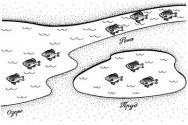What is Bazarov’s attitude towards the Russian people? Bazarov's attitude towards others
Ivan Sergeevich Turgenev wrote the novel “Fathers and Sons” at a difficult time for our country - in 1861. The action of the work takes place in 1855-1861. In those days, the war with Turkey ended, which Russia lost, and Alexander II replaced the deceased ruler Nicholas I.
Let us consider in this article Bazarov’s attitude towards the Russian people. After all, through this hero the problem of serfdom and the plight of the Russian peasant are addressed.
Pictures of village life
The main character of the novel is the commoner Bazarov. The attitude of this hero towards the people - the most important topic works. The story begins with gloomy pictures of life in a pre-reform village. Turning to nature is no coincidence. Everywhere the reader encounters desolation and destruction, mismanagement and poverty. Even Arkady Kirsanov admits that transformations in the village are simply necessary. We are talking here about the reform that took place in 1861, which, in fact, did not change anything in the situation of the peasants.
Origin of Bazarov

Of all the characters in the novel, the closest to the peasantry is Yevgeny Bazarov. The attitude of this character towards the people largely determines his origin. Throughout the work, he repeatedly emphasizes that he is a commoner and calls himself a doctor’s son, a doctor. In a conversation with Pavel Petrovich Kirsanov, Evgeny Bazarov replies with pride that his grandfather plowed the land, so the man is more likely to recognize him as a compatriot than Pavel. Kirsanov, says Evgeniy, doesn’t even know how to talk to peasants. However, can Bazarov himself do this? This hero’s attitude towards the people (quotes from the text only confirm this) was not simple either.
But Evgeny is right. Pavel Petrovich really not only cannot communicate with his men, but also manages them.
Maxim Gorky about Bazarov
As Maxim Gorky wrote, in Evgeniy’s relations with the Russian people, one should notice, first of all, the absence of any “sweetness” or “pretentiousness.” The peasants like this, and that is why the servants and children love Evgeniy so much, despite the fact that he does not shower them with money and gifts. Men see him as smart and common man, but at the same time, Eugene is a stranger to them, because he does not know the needs of the peasantry, everyday life, fears and hopes, beliefs, concepts and prejudices.
Attitude to the main character of the peasants

Bazarov is really loved in the Kirsanovs' house. Everyone got used to him, “the servants also became attached,” although he made fun of them. Dunyasha willingly giggled with Bazarov and looked at him significantly, sideways, even Peter - and he “grinned and brightened” as soon as the young man paid attention to him. The boys ran after Evgeniy “like little dogs.”
How does Evgeny Bazarov behave with peasants?
The situation of the peasants in Bazarovo evokes not tenderness, but only anger. This hero soberly assesses the people and their strengths: he sees superstition, lack of education, discontent and downtroddenness. Unlike Pavel Petrovich, who affectionately calls the people pious, patriarchal, but sniffs cologne when talking to them, Evgeny does not keep his distance from the peasants. The Kirsanov brothers, landowners, are incapable of running a household and do not know how to organize things on their estate. Their household creaked and crackled, “like an unoiled wheel.”
Attitude towards the peasants of Pyotr Petrovich
The speech of the heroes as evidence of connection with the Russian people
The speech of the heroes serves as clear evidence of their connection with the people. Thus, Pavel Petrovich uses many foreign words, pronouncing them in his own manner (“eftim”, “principles”), deliberately distorting them. Evgeniy’s speech is characterized by accuracy, simplicity, precision of expressions, many sayings and proverbs (“there goes the road,” “the song is done,” etc.).
The ambiguity of perception of Bazarov by peasants
Bazarov sincerely wants to help the peasants. He wants to “at least scold them,” but also “mess with” the men. But Evgeniy still does not fully understand the needs of this segment of the population, evidence of which is the scene of Evgeniy’s conversation with a peasant, which took place on his father’s estate, after which the peasant responded to him like this: “so, he was chatting something.” The author notes that Bazarov, who knew how to talk with men, did not even suspect that in the eyes of the latter he was “something like a fool.” Bazarov’s special attitude towards the people still does not help him fully understand the peasants.
Eugene's loneliness

As we see, Evgeniy is lonely. The Kirsanov family does not understand him, his beloved Odintsova also rejects him, the hero is not interested in his parents, and to this is added his cutting off from the people. Why did this happen, what is the reason for Bazarov’s loneliness? This person is one of the representatives of the type of early common revolutionary, and it is always difficult for the new generation to pave the way, because nothing illuminates it, they have to go at random.

The consciousness of the masses has not yet matured to understand the revolutionary idea of the nihilistic raznochintsy, and at the end of the work Evgeniy himself understands this. He says, dying, that Russia does not need him.
Bazarov: attitude towards the people
The quotes from the work given above prove that Bazarov’s relationship with the peasants was by no means straightforward. Ivan Sergeevich Turgenev, however, sees main reason The hero’s doom is not in his ability to find an approach to a man. In fact, it is that he does not have any positive program, he only denies, therefore another important reason for loneliness is internal conflict which Bazarov is experiencing. This hero’s attitude towards the people is thus tragic - he sees the needs of the peasants, but cannot change anything. But even in the face of death, Eugene remains as he was: not afraid to be weak, doubtful, able to love, sublime, and this is his uniqueness and attractiveness.
Capacity for love
Ability to true love Turgenev always considered the most important criterion for assessing a person. The author shows that here too this character is superior to the district aristocrats, including his beloved, the selfish and mentally cold Odintsova.
Conclusion

Thus, it should be said that the theme of serfdom is raised in the work precisely by main character- Bazarov. This character’s attitude towards the people is as follows: although he respected and loved the Russian people, he wanted a better life for him, but he did not believe in his soul in the people’s forces and, more importantly, he was alien to the people and did not understand them.

Turgenev dedicated his work to the memory of Vissarion Grigorievich Belinsky (life - 1811-1848), the great Russian commoner. Bazarov's attitude towards the people in the novel "Fathers and Sons" is not the attitude of an individual person. The text reflects the breath of the era. The author reproduces the situation of our country on the eve of the reform, and also depicts a new man who, in a collision with the old world doomed to destruction, proves his triumph over the aristocracy of democracy. Bazarov’s attitude towards the people is typical of the emerging stratum of commoners-nihilists at that time.
The plot and problems of the work do not lose their relevance, as evidenced by a number of films based on the novel “Fathers and Sons”. Since the beginning of the 20th century, there are 6 most famous Russian film adaptations, the first of which dates back to 1915 (director - Vyacheslav Viskovsky), and the last one was released quite recently - in 2008 (director - Bazarov’s attitude towards the people, quotes from the text and other information can be found in each of them.
Observant Bazarov, living in the village of the Kirsanovs, and then with his parents, began to meet with men more often. He drew attention to them in Maryino. He was interested in a peasant driving tangled horses on the morning before the duel. In the village, Evgeniy’s father had the opportunity to communicate with people more often. On the one hand, sick people were brought from the villages to Vasily Ivanovich, and these people were undoubtedly seen by Bazarov. On the other hand, he, being a restless and active nature, himself went to the village and personally met the serfs.
Bazarov, of course, knew that progressive people saw the people as the main historical force. “Well,” said Bazarov, turning to the peasant, “explain to me your views on life, brother: after all, in you, they say, all the strength and future of Russia will begin from you.” new era in history, you will give us both a real language and laws.” One cannot help but see in the very formulation of the question Evgeniy’s ironic attitude towards the peasant. The peasant either remained silent and did not answer him, or spoke very reluctantly, only to say something: “And we can ... too, therefore ... what is the limit for us, approximately.” Not satisfied with such an “answer,” Evgeniy, without changing the tone of the conversation at all, moved on. “Can you explain to me what your world is?..,” he asked, “and is this the same world that stands on three fish?” And the peasant “explained” him: “This, father, the earth stands on three fishes... and against ours, that is, the world knows, the master’s will; therefore you are our fathers. And the more strictly the master demands, the nicer it is to the peasant.”
This dialogue is very remarkable and has deep meaning. It ends with the author's remark that Bazarov once, after a conversation with a peasant, “shrugged his shoulders contemptuously and turned away.” Not only did he not hear the living folk wisdom, but felt some kind of patriarchal wildness that outraged him.
Bazarov did not understand his interlocutor. But were it only the men with whom he spoke who represented the essence folk life? Unfortunately, we do not find other types of peasants similar to those portrayed by Nekrasov in Turgenev’s novel. True, Turgenev noted that the men spoke to Bazarov as to a master, with trepidation, timidity and excitement, like a schoolchild before a strict and demanding teacher. Between themselves, they spoke differently, easily, revealing a sound mind.
So, to the question of a peasant neighbor, “What were you talking about?” ..About arrears, or what?” - the man answered very calmly, with careless severity, but businesslike: “What about arrears, my brother! .. so, chatted something; I wanted to scratch my tongue. It is known, master; does he really understand? In the minds of these peasants, the scientist Bazarov turned out to be “something like a clown.”
Bazarov and the Russian people (based on the novel by I. S. Turgenev “Fathers and Sons”)
The novel “Fathers and Sons” by I. S. Turgenev was written in a difficult era for Russia, in 1861. The period of its operation was 1855-1861 - the period when the war lost by Russia with Turkey ended, the deceased Nicholas I was replaced by Alexander II.
Bazarov is a commoner. The novel opens with pictures of a pre-reform village: “The places they passed through could not be called picturesque... There were also rivers with dug-up banks, tiny ponds with thin dams, and villages with low huts under dark, often up to half of them with scattered roofs, and crooked threshing sheds with walls woven from brushwood and gaping gates near empty barns, and churches, either brick with plaster falling off here and there, or wooden with leaning crosses and ruined cemeteries... As if on purpose, the peasants came across all shabby, wearing bad nags; roadside willows with stripped bark and broken branches stood like beggars in rags; emaciated, rough, as if gnawed, cows greedily nibbled grass in the ditches. It seemed that they had just escaped from someone’s menacing, deadly claws - and, caused by the pitiful appearance of exhausted animals, in the middle of a red spring day, the white ghost of a cheerless endless winter with its blizzards, frosts and snows arose...” And this author’s appeal to pictures of nature is not accidental. The reader sees destruction and desolation everywhere; poverty and mismanagement. And even Arkady admits that “transformations are necessary” in the village. It's about about the reform of 1861, which essentially did not change anything in the situation of the peasants.
Of all the heroes, Bazarov is closest to the people. More than once throughout the novel he emphasizes his “multi-Chin” origins and calls himself a doctor, a doctor’s son. Talking to Pavel Petrovich Kirsanov, he “answers with arrogant pride”: “My grandfather plowed the land... Ask any of your men which of us - you or me - he would most likely recognize as a compatriot. You don’t even know how to talk to them.”
Bazarov is right. Pavel Petrovich not only doesn’t know how to talk to them, but he also doesn’t know how to manage his men...
M. Gorky wrote: “In Bazarov’s relations with the common people, one must notice, first of all, the absence of any pretentiousness, any sweetness. The people like it, and that’s why the servants love Bazarov, the kids love him, despite the fact that he doesn’t treat them at all and doesn’t shower them with money or gingerbread... The men have a heart for Bazarov because they see him as simple and smart person, but at the same time this person is a stranger to them, because he does not know their way of life, their needs, their hopes and fears, their concepts, beliefs and prejudices.” One cannot but agree with the opinion of M. Gorky. Bazarov is actually loved in the Kirsanovs’ house: “Everyone in the house got used to him... The servants also became attached to him, although he made fun of them: they felt that, after all, they were their brother, not a master. Dunyasha willingly giggled with him and looked sideways at him, running past like a quail; Peter, an extremely proud and stupid man... - and he grinned and brightened as soon as Bazarov paid attention to him; the yard boys ran after the “doh-tour” like little dogs.”
A clear indication of the connection with the people is the speech of the heroes. Pavel Petrovich uses many foreign words, deliberately distorts them, pronounces them in his own manner (“principles”, “eftim”). Bazarov’s speech is characterized by simplicity, precision and accuracy of expressions, many proverbs and sayings (“the song is sung”, “Moscow burned down from a penny candle”, “we have heard this song many times”, “there goes the road”) .
Bazarov honestly wants to help the people: “I want to mess with people, even scold them, and mess with them.” But proof that Evgeny still does not quite understand the needs of the peasants can be seen in the scene of Bazarov’s conversation with a man on his father’s estate, after which the man speaks about him: “... so, he was chatting about something; I wanted to scratch my tongue. It is known, master; Does he understand?" And the author adds: “Alas! Bazarov shrugged his shoulders contemptuously, knew how to talk to the peasants... and did not suspect that in their eyes he was still something of a fool... "
We see that Bazarov is lonely. He is not understood in the Kirsanov family, Odintsova rejects him, and he himself is not interested in being with his parents; The last thing is cutting off from the people. What is the reason for his loneliness? Bazarov is a representative of an early revolutionary commoner, one of the first in his field, and it is always difficult for people of the new generation, because they are the first.
The consciousness of the people has not yet matured to understand the idea of common nihilists, and Bazarov himself understands this in the end. Dying, he says: “...Russia needs me... No, apparently I don’t need it...”
However, I. S. Turgenev sees the doom of his hero not in the inability to find mutual language with a man He has no positive program, he only denies; The hero's internal conflict is another reason. But even before death, the hero remains as he always was: doubting, not afraid to be weak, sublime, able to love, and this is his uniqueness.
- New!
I. S. Turgenev's novel "Fathers and Sons" was written in 1861 - at a time when the centuries-old foundations of Russia were changing. One of the themes of the work is eternal theme love. In the novel we see bright love stories: the love story of Pavel Petrovich...
- New!
“In his works, he usually drew attention to the question that was next in line and was already vaguely beginning to worry society,” Dobrolyubov wrote about Turgenev, characterizing the writer’s extraordinary ability to respond to the “topic of the day.” Exactly...
Philosophical views Bazarov and their trials by life In the novel by I.S. Turgenev's "Fathers and Sons" depicts Russia in the late fifties of the nineteenth century, a time when the democratic movement was just gaining strength. And as a result of this there is...
I. S. Turgenev’s novel “Fathers and Sons” perfectly reveals the writer’s ability to guess “new needs, new ideas introduced into public consciousness" The bearer of these ideas in the novel is the commoner democrat Evgeny Bazarov. The hero's opponent...
Pavel Petrovich Kirsanov, a man with a “dandy-dry” soul. The son of a military general in 1812, he graduated from the Corps of Pages, and a brilliant career awaited him. military career. Failed love to a woman with a “mysterious look,” Princess R., turned his whole life upside down....
In his novel “Fathers and Sons,” I. S. Turgenev, among other topics, raises the topic, so to speak, of false discipleship. From the first pages of the work we are introduced to two “good friends,” as Arkady Kirsanov calls himself and Bazarov....
You have neither insolence nor anger, but only youthful courage and youthful enthusiasm.
It is better to break stones on the pavement than to allow a woman to take even the tip of a finger.
If you decide to mow everything down, kick yourself too!
If a woman can hold a conversation for half an hour, this is a good sign.
You can't undo the past...
It's amazing how people still believe in words.
There is no need to hesitate; Only fools and smart people procrastinate.
Since I’ve been here, I’ve been feeling really bad, as if I’ve read Gogol’s letters to the Kaluga governor’s wife.
As for time, why will I depend on it? It’s better to let it depend on me.
The only good thing about a Russian person is that he has a very bad opinion of himself. The important thing is that two and two make four, and the rest is all nonsense.
The old joke is death, but a new one for everyone.
There is no need for you to get excited, because I don’t care at all. A romantic would say: I feel that our paths are starting to diverge, but I’m just saying that we’re tired of each other.
When I meet a person who would not give up in front of me, then I will change my opinion about myself.
There are not as many of us as you think.
A decent chemist is twenty times better than any poet.
Flying fish can stay in the air for a while, but soon they must splash into the water.
Nature is not a temple, but a workshop, and man is a worker in it.
Such a rich body! At least now to the anatomical theater.
A man who staked his entire life on a woman’s love and, when this card was killed, became limp and sank to the point that he was incapable of anything, such a man is not a man, not a male.
Maybe, for sure, every person is a mystery.
Yes, go ahead and try to deny death. She denies you, and that's it!
There was an empty space in the suitcase, and I put hay in it; It’s the same in our life’s suitcase: no matter what they fill it with, as long as there is no emptiness.
A person is able to understand everything - how the ether trembles and what happens in the sun; but how a person can blow his nose differently than himself, he is not able to understand.
He who is angry at his pain will certainly overcome it.
A real person is not one about whom there is nothing to think, but who must be obeyed or hated.
All people are similar to each other both in body and soul; Each of us has the same brain, spleen, heart, and lungs; and the so-called moral qualities the same for everyone: small modifications mean nothing.
Every person must educate himself, well, at least like me, for example...
I don’t share anyone’s opinions; I have mine.
Blow on the dying lamp and let it go out.
Quotes from Pavel Petrovich Kirsanov
“We, people of the old century, believe that without principles... you can’t take a step, you can’t take a breath.”
Personality, dear sir, is the main thing; The human personality must be as strong as a rock, for everything is built on it.
They [the Russian people] sacredly honor traditions, they are patriarchal, they cannot live without faith.
The young people were delighted. And in fact, before they were just idiots, but now they suddenly became nihilists.
A thought occurred to me; Why not express it?
Either I'm stupid or this is all nonsense.
We cannot understand each other; I, at least, do not have the honor to understand you.
Quotes from Arkady Kirsanov
We need to arrange our lives in such a way that every day is significant.
A maple leaf, when it falls to the ground, looks like a butterfly, and this is strange - because the driest and deadest is similar to the most cheerful and lively.








